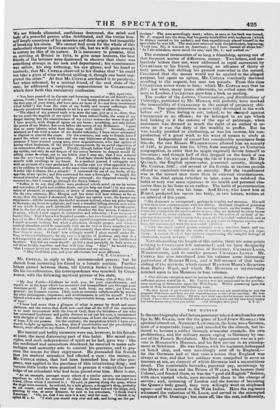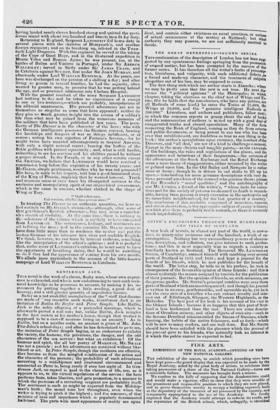THE HUSSAR
Is the autobiography of a Chelsea pensioner taken down from his own lips by Mr. GLEIG, now (by the grace of LoidJOHN RUSSELL) his spiritual attendant. NORBERT LANDSHEIT, the hero, was a German, born of a respectable family, and intended for the church, but in- duced to become a soldier through avuncular example, his own predilections, and the military mania raging in Germany by rea- son of the French Revolution. His first appearance was as a pri- vate in Hompesch's Hussars, and his first service in an encamp- ment at Schwerin. He was thence, with his regiment, kidnapped on board ship, and very una illingly sent off to England,— for the Germans had at that time a notion that England was always at war, and that her soldiers were compelled to serve as marines at sea, an element of which Germans had a superstitious dread. The comfortable barracks, punctual pay, reviewings by the Duke of YORK and the Prince of W ALES, who became their Colonel, and feasted them, as was the "good old English " fashion, with oxen roasted whole, soon reconciled them to the change of service; and, dreaming of London and the honour of becoming the Queen's body guard, they very willingly went on shipboard again—and were carried to the West Indies. Here the regiment witnessed the reduction of St. Lucia, and served in the attempted conquest of St. Domingo ; but came off, like the rest, indifferently.
having landed nearly eleven hundred strong and quitted the pesti- ;emus island with about two hundred and twenty men fit for duty.
Returning to England, Sergeant LANDSHEIT did home duty in several places with the skeleton of Hompesch's, and another foreign regiment ; and on its breaking up, inlisted in the Twen- tieth Light Dragoons. With this regiment he served at the taking of the Cape of Good Hope, and in the ill-starred expedition to Monte Video and Buenos Ayres; be was present, too, at the battles of Relics and Vimiero in Portugal, under Sir ARTHUR WELLESLEY; served in Sicily under Sir Jsmss CRAIG, and in Catalonia against SVCIIET, Qrst under Sir JOHN MURRAY, and afterwards under Lord WILLIAM BENTINCK. At the peace, our hero was discharged on the pension of a shilling a day ; and after living as gtoom in several families, be Lad the sagacity, often wanted by greater men, to perceive that he was getting behind the age, and so procured admission into Chelsea Hospital.
With the general conduct of the army Sergeant Lsamsnerr bad nothing to do; and he takes no cognizance of it except in one or two instances,—which are probably, interpolations of his editorial amanuensis. His personal adventures are not in themselves so singular as some that have appeared ; neither do they give us much greater insight into the arcane of a soldier's life than what may be gained from the numerous memoirs of the military that have been published of late years. The pecu- liarity of The Hussar is in the character of the hero ; who with the German intelligence possesses the German content, bearing the hardships and dangers of war as things indifferent, or of course ; noting his own rejection of Fortune's favours,—for be might twice have married advantageously in tropical America, with only a slight natural regret ; bearing the buffets of the fickle goddess with patient equanimity ; and, what is still harder, submitting to see his services and his abilities passed by without
a proper reward. In the French, or in any other service except
the Austrian, we believe that LANDSHEIT would have received a .commission long before the expiration of his twenty years; and Mr.GLEIG, simple gentleman, wonders why he was not promoted ! His hero, in reply to his inquiry, told him a good-humoured story of the King of Prussia, implying that he wanted interest. Truth and common sense at once trace his ill-requited services to the
exclusive and monopolizing spirit of our oligarchical government, which is the same in essence, whether clothed in the shape of 'Whig or Tory.
" Quid refett mea, Cui serviam, elittlia, dum purtem mess ?"
In treating The Hussar as an authentic narrative, we have re- lied entirely on Mr. (4 statement,—although, after sonic of that geutleman's Kentish adventure, this may seem a consider- ch'e stretch of credulity. At the same time, there is nothing in till substance of the volume which is unlikely to have emanated from LANDSH:,.IT. The occurrences, feelings, and sentiments are nil befitting the man : and in the narrative Mr. GLEIG SOCIDS to have done little more than to condense the matter and put the broken German of his informer into clear and readable English. We think, however, we can trace by internal evidence, something like the interpolation of the editor's opinions ; and it is probable that, under cover of LANDSHEIT'S criticism, he is not sorry to have the opportunity of breathing stains, that lie would be unwilling to do if they had the appearance of coming from his own mouth. We allude more particularly to the account of the little-known campaign of Lord WILLiam BENTINCK in Catalonia.



























 Previous page
Previous page